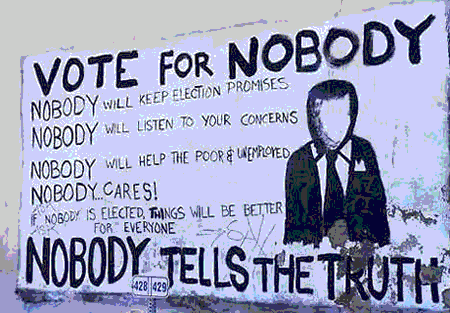As the viciousness of capitalism engulfs ever more of us, our yearnings for change are approaching desperation. The system's current leader, Barack Obama, has shown us that the only change we can believe in is what we ourselves create.
To do that, we need to know what is possible in our times and what isn't. The bitter probability is that none of us will see a society in which we'd actually want to live. Even the youngest of us will most likely have to endure an increasingly unpleasant form of capitalism. Despite its recurring crises, this system is still too strong, too adaptable, and has too many supporters in all classes for it to be overthrown any time soon. We're probably not going to be the ones to create a new society.
But we can now lay the groundwork for that , first by exposing the hoax that liberal reforms will lead to basic changes. People need to see that the purpose of liberalism is to defuse discontent with promises of the future and thus prevent mass opposition from coalescing. It diverts potentially revolutionary energy into superficial dead ends. Bernie Sanders' "long game" campaign is really only a game similar to that of his reformist predecessor, Dennis Kucinich, designed to keep us in the "big tent" of the Democratic Party. Capitalism, although resilient, is willing to change only in ways that shore it up, so before anything truly different can be built, we have to bring it down.
What we are experiencing now is the long war the ruling elite is fighting to maintain its grip on the world. The current phase began with the collapse of Keynesian capitalism, which flourished from the 1950s into the '70s, when the primary consumer market was in the capitalist headquarter countries of North America and Western Europe. Corporations were able to stimulate domestic consumption and quell worker discontent there by acceding to labor's demands for better wages and conditions. That led to a 30-year bubble of improvement for unionized workers, predominantly male and white, that began to collapse in the '80s as capitalism gradually became globalized.
Then to maintain dominance Western corporations had to reduce labor costs in order to compete against emerging competition in low-wage countries such as China, India, Russia, and Brazil. Also international consumer markets became more important than the home market, but reaching them required low prices. So capitalist leaders reversed hard-won reforms, forcing paychecks and working conditions in the West down. And they tried to keep control of crucial Mideast oil resources by tightening their neo-imperialist hold on that region: overthrowing governments, installing dictators, undermining economies.
This aggression generated armed resistance: jihadist attacks against the West. Our response has been the current holy war against terror. All of this dreadful suffering is just one campaign in capitalism's long war for hegemony. Any dominator system -- including capitalism, patriarchy, and religious fundamentalism -- generates violence.
Since we are all products of such systems, the path out of them will include conflict and strife. Insisting on only peaceful tactics and ruling out armed self defense against a ruling elite that has repeatedly slaughtered millions of people is naà �ve, actually a way of preventing basic change. The pacifist idealism so prevalent among the petty-bourgeoisie conceals their class interest: no revolution, just reform. But until capitalism and its military are collapsing, it would be suicidal to attack them directly with force.
What we can do now as radicals is weaken capitalism and build organizations that will pass our knowledge and experience on to future generations. If we do that well enough, our great grandchildren (not really so far away) can lead a revolution. If we don't do it, our descendants will remain corporate chattel.
(Note: You can view every article as one long page if you sign up as an Advocate Member, or higher).






